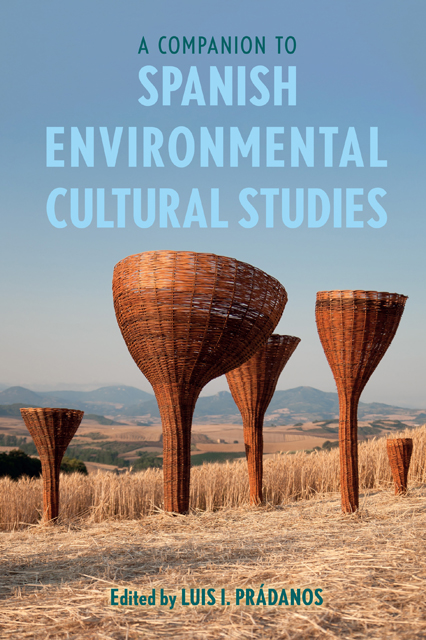Book contents
- Frontmatter
- Contents
- List of Illustrations
- List of Contributors
- Note on the Translations
- Acknowledgements
- Introduction: Spanish Environmental Cultural Studies
- Part I Environmental Cultural History and Political Ecology
- Part II Water and Power
- Part III Ecologies of Memory and Extractivism
- Part IV Animal Studies and Multispecies Ethnographies
- Part V Food Studies and Exploitative Ecologies
- Part VI Ecofeminism
- Part VII (Neo)Colonial and Racialized Ecologies
- Part VIII Tourism and the Environmental Imagination
- Part IX Eco-Mediation and Representation
- Part X Trash and Discard Studies
- Bibliography
- Index
16 - Disaster, Coloniality, and the Franco Dictatorship
Published online by Cambridge University Press: 08 June 2023
- Frontmatter
- Contents
- List of Illustrations
- List of Contributors
- Note on the Translations
- Acknowledgements
- Introduction: Spanish Environmental Cultural Studies
- Part I Environmental Cultural History and Political Ecology
- Part II Water and Power
- Part III Ecologies of Memory and Extractivism
- Part IV Animal Studies and Multispecies Ethnographies
- Part V Food Studies and Exploitative Ecologies
- Part VI Ecofeminism
- Part VII (Neo)Colonial and Racialized Ecologies
- Part VIII Tourism and the Environmental Imagination
- Part IX Eco-Mediation and Representation
- Part X Trash and Discard Studies
- Bibliography
- Index
Summary
Introduction
Disasters, and the way they are dealt with, can be interpreted as reflecting more general features of relationships between the environment, politics, and culture. More specifically, they bring to the fore how these relationships are shaped by different forms of violence. I aim to demonstrate this by analyzing one specific disaster with respect to how it was coined by violent practices of exploitation, systems of oppression, and forms of representation that were and are characteristic of the Franco dictatorship and various forms of colonialism. I study a disaster that has been occurring outside of Spain on the island of Annobón, forming part of the former Spanish colony of Equatorial Guinea – a disaster that was set in motion in 1988, twenty years after the country’s formal independence in 1968, and at a time that is considered to be “after” the end of the Franco dictatorship. I will thus examine how, in the realm of disaster, the Franco dictatorship, colonial structures, and thought patterns display and unfold their continuity. To put it another way, this contribution shows how environmental disasters generate and reveal the “coloniality” as well as what might be called the “francoisticity” of the present.
Toxic Waste on Annobón
During the 1980s a number of European and North American companies shipped substances labeled by contemporaries as “toxic waste from Europe” to various African countries. They made deals with African entrepreneurs and sometimes with local politicians, who were promised relatively large amounts of money in exchange for facilitating the import of the hazardous materials. In 1988 the small and remote island of Annobón became a designated destination for such toxic waste. According to sources such as GreenPeace and various journalistic investigations, representatives of the country’s government – since 1979 and to this day led by Teodoro Obiang Nguema Mbasogo – made plans with a British, and later also a US, firm that foresaw the deposit of two million drums of “mixed chemical wastes from Europe” in a large hole to be dug by convict laborers during a period of 10 years.
- Type
- Chapter
- Information
- A Companion to Spanish Environmental Cultural Studies , pp. 179 - 187Publisher: Boydell & BrewerPrint publication year: 2023



